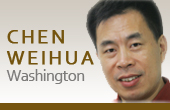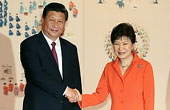Abe's move on collective defense fails to get understanding at home, abroad
(Xinhua) Updated: 2014-07-09 16:40TOKYO - Japanese Prime Minister Shinzo Abe's move to allow Japan's Self-Defense Forces to exercise right to collective self-defense through reinterpreting the country's pacifism Constitution failed to obtain understanding at home and abroad, according to surveys by Japanese media.
After a survey on editorials released by 43 domestic newspapers on July 2, only three local newspapers in Ishikawa, Toyama and Fukushima prefectures showed their support to the Abe administration's approval to the collective defense, according to Japan's popular Asahi Shimbun Wednesday.
The Akita-based Sakigake Shimpo criticized in its editorial that the postwar peaceful path Japan followed for seven decades was overturned by current ruling bloc through their 13-hour negotiations and makes Japan a country that could wage a war.
The Okinawa Times described Abe's move on the collective defense as a coup against the country's war-renouncing Constitution, adding the move will further make Okinawa a military fortress and raise concerns that the Okinawa people will be dragged into war again.
According to the survey, among the six major national newspapers, the Asahi Shimbun, the Mainichi Shimbun and the Tokyo Shimbun oppose to lift the constitutional ban on the collective defense, while the Yomiuri Shimbun, the Sankei Shimbun and the Nikkei Shimbun support the government decision.
In Tuesday's survey on international opinions on the controversial issue, the Nikkei Shimbun concluded that Japan's decision on collective defense did not acquire understandings worldwide.
The newspaper said that a majority of overseas media tended to question that Abe made the decision without discussion with Japanese people and the move would exacerbate Japan's frayed relations with China and South Korea.
Although some US media like FOX television supported Japan's move through citing exports'remarks, the mainstream Western media maintained a passive attitude toward the issue, adding even the New York Times, a prestigious paper of the United States, Japan's key ally, criticized Abe's move in an editorial, the survey said.










